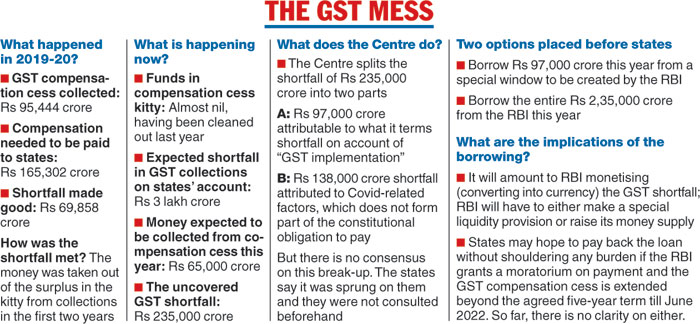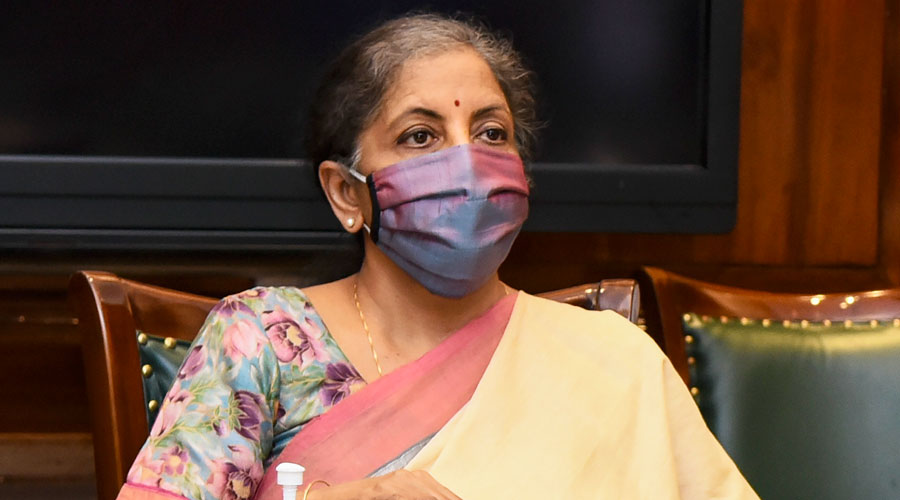The spirit of cooperative federalism lay in tatters at the altar of the Goods and Services Tax (GST) Council on Thursday after the Centre disclaimed its constitutional obligation to compensate states for any annual shortfall in tax collections this year.
The GST regime had transformed the country into a single common market in July 2017 and the states had agreed to subsume all their levies under a single tax. The Centre had promised to compensate them if collections failed to record a 14 per cent annual increment in revenues over the base year of 2015-16.
At the end of a stormy five-and-a-half-hour meeting, Union finance minister Nirmala Sitharaman left the states with two stark and disagreeable options: either borrow Rs 97,000 crore from a special window to be created by the Reserve Bank of India to meet a small part of the expected Rs 3 lakh crore shortfall in GST collections this year, or raise the entire uncovered sum of Rs 2.35 lakh crore in the form of debt.
The Centre hopes to collect just Rs 65,000 crore this year from the GST compensation cess, which is levied on a handful of “demerit goods” like luxury vehicles, aerated drinks and tobacco products.
The states, which had hoped to join forces and persuade the Centre to borrow money and pay them for the GST shortfall, were in for a shock when Sitharaman circulated a note prepared by attorney-general K.K. Venugopal that essentially said that any compensation to be paid could only come out of the cess corpus, which has been turned bone dry this year because of the large payout in 2019-20.
The government then added salt to the wounds by parcelling out the uncovered GST shortfall of Rs 2.35 lakh crore into two components: a sum of Rs 97,000 crore that it claimed was attributable to what it termed “GST implementation”, and a larger share of Rs 138,000 crore that was ascribed to what it called Covid-related factors.
The government argued that it was under no obligation to pay the Covid-related shortfall since there was no express provision in the legislation for a pandemic or crisis-related situation.
It wasn’t immediately clear on what basis the Centre had divided the uncovered GST shortfall of Rs 2.35 lakh crore into these two streams —and the Union finance minister did not elucidate either at the virtual meeting with the state finance ministers or in her interaction with the media later.
Sitharaman firmly stated that the Centre was in no position to borrow the amount on to its books and then defray the sum as the states had hoped.
The states, which have received no GST compensation in this fiscal, have been struggling to raise revenues from the few taxes they still levy and were obviously furious when presented with this virtual fait accompli.
“The government’s refusal to pay GST compensation to the states is the biggest betrayal in the history of federalism in India.… The states are feeling cheated,” said Manish Sisodia, deputy chief minister of Delhi.
An irate Punjab finance minister Manpreet Badal said the AG’s note ought to have been circulated before the meeting. “Why was this note kept under wraps till the last minute?” he asked.
“Clearly, the 41st meeting of the GST Council was not a healthy one. The Government of India has thrust a decision on us and this is not in the spirit of the GST regime. The solution that was arrived at is not satisfactory. But we have no choice. We have seven days to take this to our cabinet, where we will discuss the future course of action,” Badal told a virtual media conference later.
Sitharaman, who described the pandemic as an “act of God”, did not place the options on the table until the fag end of the meeting, sources said, thereby precluding any discussion. The states asked the Centre to send them a detailed note on the two options so that they could pore over the fine print before deciding which way to vote.
Bengal finance minister Amit Mitra said: “Most of the states are against the idea of borrowing on their books. There was hardly any time for a discussion on the options. So, the states asked for details in writing; we will respond accordingly.”
Mitra added: “But as I mentioned in my letter on Wednesday, the Union finance minister had gone on record during the 39th GST Council meeting to say that the Centre was duty bound to compensate the states. This obligation is enshrined in Section 18 of the 101st Constitution Amendment Act, which led to the creation of the GST regime.”
“Just because they (the BJP) are in a majority, it doesn’t mean that they can force a decision upon us,” said T.S. Singh Deo, cabinet minister in the Chhattisgarh government.
“The Centre, as mentioned in the GST Act, is bound to pay compensation in case of losses. Instead of asking the 31 states to borrow, why can’t the Centre borrow and distribute the amount among the states?”

Debt monetisation
Sitharaman said the Centre, in consultation with the RBI, would provide a special window to the states to borrow Rs 97,000 crore at a “reasonable” rate of interest. This money could be repaid after five years from the collection of cess.
Under the second option, the states can borrow the entire uncovered GST compensation shortfall of Rs 235,000 crore through the special window.
The Union finance minister said the Centre would facilitate discussions between the states and the RBI to ensure they get a cheap rate on the loans that would be linked to the yield on the government security depending on the maturity period.
“All states will roughly get the same rate of interest,” Sitharaman added.
Most states are likely to opt for a 10-year loan with a moratorium on repayment. But there was no assurance that it would be granted.
“This effectively implies that the RBI will have to inject a huge amount of liquidity -- or it will have to crank up its money supply. In other words, either directly or indirectly there will be monetisation of this part of the deficit, which will have its own implication on the economy as a whole,” said M. Govinda Rao, economist and a member of the 14th finance commission.
The problem is exacerbated by the fact that most states do not have the head room to borrow because of the limits that are placed on them under the Fiscal Responsibility and Budget Management (FRBM) Act.
Sitharaman offered to get round this problem by relaxing the limit.
“I have offered states a 0.5 per cent relaxation on their FRBM limit if they decide to borrow on their own without fulfilling the conditions of completing the tasks under the Atmanirbhar Bharat programme,” she said.
In May, the Centre had raised the borrowing limits of the states to 5 per cent of their gross domestic product for 2020-21 granting them access to an extra resource pool of Rs 4.28 lakh crore. A part of this was linked to specific reforms to be implemented in terms of the Atmanirbhar Bharat stimulus package.
It was not immediately clear if the relaxation was being made within the 5 per cent limit or if the borrowing cap was being effectively raised to 5.5 per cent.
Revenue secretary Ajay Bhushan Pandey said a sum of only Rs 97,000 crore was attributable to the implementation of the GST, while the rest was on account of the coronavirus pandemic hitting the economy.
“We do not know whether they have run an economic model to separate out the two streams to determine which part of the shortfall is attributable to GST implementation and which portion relates to Covid-related issues,” said Mukesh Bhutani, managing partner of BMR Legal.
Sitharaman insisted that the states would be able to repay the borrowings based on the compensation cess collections in future years. Although she did not state this explicitly, there is a view among pundits that the cess may be extended beyond the original five-year term till June 2022 -- which means that the consumers will eventually end up bearing the burden.
“History tells us that when a cess is imposed in this country, it continues forever. A cess, which is an exception, is increasingly becoming the norm,” said Pratik Jain, partner and national tax leader at PwC. “Intuitively, I think the states will opt to borrow the full Rs 2.35 lakh crore this year itself. But we will have to wait and see.”










